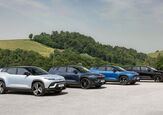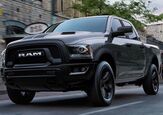BMW Buying Out Brilliance Automotive in China, Adding Capacity for U.S.

Now that China has relaxed its joint-ownership mandates, BMW has announced that it will procure a majority stake in its venture with Brilliance Automotive. The German firm will be the first foreign automaker to have majority control of its business in the region.
Being first will not come cheaply, however. It will cost BMW $4.2 billion to assume control with a majority stake of 75 percent of the business — albeit as part of a larger deal. All the manufacturer has to do is come up with the funds and wait until 2022, when rules limiting foreign ownership for all Chinese auto ventures are officially lifted.
BMW has said that both partners have signed a corresponding agreement, but noted that the transaction is still subject to the approval of the relevant authorities and the consent of the Brilliance China Automotive Holdings Ltd Shareholders’ Meeting.
The plan also extends the cooperative contract that makes BMW Brilliance Automotive (BBA) possible through 2040 and includes investments into new and existing plant structures in Shenyang (where Brilliance is currently headquartered) over the coming years. At least one new facility is expected following the deal’s ratification, with additional cash going into modernizing older factories.
“We are now embarking on a new era,” BMW CEO Harald Krueger said during the plan’s announcement. According to Reuters, he also thanked Chinese Premier Li Keqiang, whom he said “personally supported” the arrangement.
With both the United States and China looking as if they are going to continue escalating auto tariffs against each other, The People’s Republic may have been left with little recourse. It’s already procured access to Western tech and secured longterm investments since becoming the world’s largest auto market. Foreign automakers have also wanted more control of Chinese operations ever since they started doing business within the country.
Everyone expects other manufacturers to follow suit. Daimler boss Dieter Zetsche told Reuters last week that signals from the Chinese authorities were encouraging. However, Dr. Z noted that Mercedes-Benz did not yet have legal permission to make any financial moves that would allow it to buy out BAIC Motor and take majority control of Beijing Benz.
“If we do, we need to see what opportunities there are,” Zetsche said at the Paris Motor Show.
Such an arrangement is also likely to help automakers cope with China’s dwindling demand for luxury vehicles. BMW has been among the hardest hit, since it ships its most popular SUVs from its U.S. plant in Spartanburg to China. Those vehicles have been subjected to several suspicious “customs investigations” and slapped with exceptionally high retaliatory tariffs.
“[The] number one reason why we invest in China is because we are absolutely convinced the market has a further growth potential,” explained BMW finance chief Nicolas Peter. He also said the company would be investing in extra capacity for the United States, which is not considered a growth market.
Our hot take? The trade war has made it so that it only pays to build where you sell.

A staunch consumer advocate tracking industry trends and regulation. Before joining TTAC, Matt spent a decade working for marketing and research firms based in NYC. Clients included several of the world’s largest automakers, global tire brands, and aftermarket part suppliers. Dissatisfied with the corporate world and resentful of having to wear suits everyday, he pivoted to writing about cars. Since then, that man has become an ardent supporter of the right-to-repair movement, been interviewed on the auto industry by national radio broadcasts, driven more rental cars than anyone ever should, participated in amateur rallying events, and received the requisite minimum training as sanctioned by the SCCA. Handy with a wrench, Matt grew up surrounded by Detroit auto workers and managed to get a pizza delivery job before he was legally eligible. He later found himself driving box trucks through Manhattan, guaranteeing future sympathy for actual truckers. He continues to conduct research pertaining to the automotive sector as an independent contractor and has since moved back to his native Michigan, closer to where the cars are born. A contrarian, Matt claims to prefer understeer — stating that front and all-wheel drive vehicles cater best to his driving style.
More by Matt Posky
Latest Car Reviews
Read moreLatest Product Reviews
Read moreRecent Comments
- MaintenanceCosts What is the actual out-the-door price? Is it lower or higher than that of a G580?
- ToolGuy Supercharger > Turbocharger. (Who said this? Me, because it is the Truth.)I have been thinking of obtaining a newer truck to save on fuel expenses, so this one might be perfect.
- Zerofoo Calling Fisker a "small automaker" is a stretch. Fisker designed the car - Magna actually builds the thing.It would be more accurate to call Fisker a design house.
- ToolGuy Real estate, like cars: One of the keys (and fairly easy to do) is to know which purchase NOT to make. Let's see: 0.43 acre lot within shouting distance of $3-4 million homes. You paid $21.8M in 2021, but want me to pay $35M now? No, thank you. (The buyer who got it for $8.5M in 2020, different story, maybe possibly.) [Property taxes plus insurance equals $35K per month? I'm out right there lol.] Point being, you can do better for that money. (At least the schools are good? Nope lol.)If I bought a car company, I would want to buy Honda. Because other automakers have to get up and go to work to make things happen, but Honda can just nap away because they have the Power of Dreams working for them. They can just rest easy and coast to greatness. Shhhh don't wake them. Also don't alert their customers lol.
- Kwik_Shift_Pro4X Much nicer vehicles to choose from for those coins.


































Comments
Join the conversation
Missed opportunity - if they'd bought BYD they'd barely have needed to change the logo.
CHINA...WHAT A DISGRACE!!! actually that one is serious